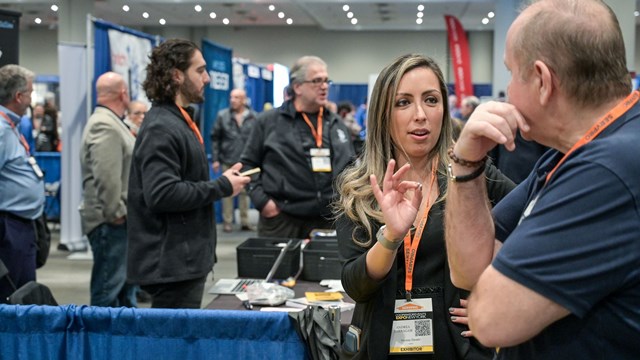
In an upscale lakeside community near Orlando, the pace of home sales unaccountably accelerated in 2009. At first, the new owners paid their assessments and fees. Then some of the homes were rented to subtenants, and others changed hands again. Their monthly fees went into arrears, and assessments became delinquent.
“It was a year or two before we realized anything strange was going on,” recounts Sue Carpenter, who at the time was vice president of marketing for the Orlando office of Associa, Community Management Professionals, Inc., and remains a consultant for the firm. “It was a while before we were able to link them together,” she says. “They were in different names but we saw where the mail was going. We noticed they didn’t pay. Then we started getting phone calls from the IRS and the FBI.”
The board learned later that a buyer from outside Florida had purchased 23 of the community’s 362 homes and put them in other peoples’ names, but never paid any mortgages or assessments. “She just kept flipping them,” Carpenter says. “She was part of a group with a New York real-estate company that was putting the houses in the names of clients in New York who thought they were buying houses in Florida as an investment.”
As the scammer’s fraud unraveled, she was trying to leave town when the authorities handcuffed her at the airport. “There’s a happy ending,” Carpenter says. “She’s in jail now.”
Community Support
Despite the delinquencies, the community was able to cope because “they had a fantastic board of directors,” Carpenter says. “The board members were focused on going through the collections process, having liens put on, and filing for foreclosure when they could.
“They were very good managers of money. They had plenty of reserves, and never stopped depositing them every month even though they were over $100,000 behind on collections.”
The board tried to keep the community looking as normal as possible. They had the landscaper maintain the front yards of the delinquent houses and keep them mowed. Instead of planting annuals in the flower beds every quarter, they planted long-blooming perennials. The Christmas lights went up on schedule, and to save money the board switched to energy-efficient LED bulbs.
“Every quarter the board would issue a report so the people didn’t sit and complain,” Carpenter says. “The people supported the board. There was no panic. Instead of being hostile, they became part of the solution. By telling everybody what was going on, the board encouraged the owners to pay. During those years they had a one percent assessment increase every year. Pretty much everybody paid except the ones out there in fraudland.”
Safe Harbor Act
Under Florida’s Safe Harbor Act, a bank taking title to a foreclosed unit in a condominium, cooperative, or homeowners’ association is responsible for paying the lesser of 12 months worth of unpaid assessments and fees or one percent of the mortgage debt, leaving the association to write off the rest or pursue the new buyer for payment. Despite the safe harbor, most of the banks involved in this situation agreed to pay the full delinquent amount, Carpenter says.
The last foreclosure was concluded only recently, about five years after the fraud began. That bank invoked the safe-harbor limitation. The new buyer doesn’t want to pay the remainder to the homeowners’ association. Carpenter reports that the board has said, “OK, we’ll file for foreclosure on your new house.”
The Safe Harbor Act applies to the first-mortgage holder or its proper assignee. “If the mortgage has gone through 15 banks and has been transferred improperly, the Safe Harbor Act doesn’t apply anymore,” notes Maria C. Upthegrove, property manager at Paradise Pointe Condominium Association, Inc., near Cutler Bay in southwest Miami-Dade County. Her association has been working with attorneys who review files and pursue banks that don’t have the right to take Safe Harbor Act shelter.
“Most collection attorneys just send the one percent letter without checking whether the bank has the right to shelter its liability,” she says. “Two or three law firms saw a need to be filled. They will front the one percent cash to your association. Eventually they will collect from the bank, keep the late fees and interest, and cover their legal costs. Even if they settle, 70 percent of the time you get to collect 80 percent or even 100 percent of what’s on your books.”
Repairs and Reserves
Even without an overt fraud, a community still can descend into insolvency if the association doesn’t stay on top of repairs, raise assessments as needed to cover expenses, properly fund the reserves, move promptly to collect past-due assessments and fees, and build such delinquencies into the budget so they don’t result in a shortfall.
“Even in good times you’ll have three to five percent average delinquency,” says Bradenton-based Allen Baum, CMCA, PCAM, vice president of Resource Property Management, Inc. His company manages over 300 associations, primarily in the Tampa Bay area.
“The most common reasons for an association to slide into problems are that boards don’t want to raise the assessment, and aren’t aggressively going after people who stop paying. Some boards take pride in not raising the assessment. They think their goal is to keep assessments low as opposed to maintaining the property, even if the building hasn’t been painted in 10 years, the bushes are dying and not being replaced, and the pool furniture is broken. When they don’t raise the annual assessment adequately, you’ll see a special assessment here and another there to do the maintenance they haven’t been doing.”
Postponing necessary repairs is inadvisable, Upthegrove agrees. “If the board doesn’t make decisions to increase the maintenance or pass a special assessment, when whatever equipment or system finally fails, it causes a lot more damage than if you repaired it,” she says.
Paying Bills Promptly
If a community doesn’t collect enough to pay its bills, late fees and fines can make the situation worse. Upthegrove tells of one condominium that was so far behind on its utility bills that the electric company threatened to turn off the power.
That problem has been resolved but others remain. The previous management installed security cameras without permits, and was penalized by the county. Now county officials won’t let the current management install properly permitted cameras unless the condo pays all outstanding fines and liens.
“The people who own these apartments don’t have the money to pay out more than what they’re paying now,” Upthegrove laments. “This is a lower-income community. Its problems are directly attributable to the recession.”
Even in a higher-end community, some residents are less able than others to cope with a financial downturn. “On Clearwater Beach,” Baum says, “98 percent of the people are well-heeled and never fund the reserves. They just write a check when something needs fixing. That works but everything doesn’t last forever. Some people are not as rich today. They would have been better off to put something away every month.”
Baum says everyone, at every income level, should expect assessments and reserves to rise with regularity. “You can’t say no when the power company raises your electric bill, so why should you think the cost of maintaining your property won’t go up?” he asks.
When high-income communities have a collection problem, Carpenter says, “it’s a big one because assessments are higher. Besides poor budgeting, which happens in communities of all sizes and incomes, not collecting delinquent funds is a huge setback. Often they don’t want to embarrass Jack and Jill. Jack lost his job. Jill has been ill. Those are difficult decisions but they have to be made. If Jack and Jill can do any type of payment plan, it helps everyone. Bad spending can be an issue, too, and keeping up appearances. Managers need to work with boards of directors, and the boards have to be reasonable to get through these financial issues.”
Hard Solutions
When a community is in dire financial straits, how can it recover? One solution is to borrow money to pay creditors and fix the most immediate physical needs. “There have been associations taking a loan from reserves in emergencies,” Carpenter says, “but it has to be paid back and there needs to be proper approval and paperwork. It’s a loan, not a gift.”
Another source of loan funds is a bank. “With a $200,000 credit line at five percent, the interest is not much on a monthly basis,” Upthegrove says. “It allows you to get back on your feet and start paying off your loan.”
Baum participated in rescuing a floundering 93-unit Arizona HOA in the 1990s. The owners recalled the previous board and elected a new board, which ordered a professional reserve study to plan a repair program. To cover the costs, the new board borrowed $150,000 from a San Diego bank and raised assessments $30 a month. Once the loan was paid off, the additional money went into the reserves to build a cushion for future needs.
The most Draconian of all solutions is receivership, in which a court appoints a receiver [sometimes called a trustee] to come in, make financial decisions, and pay the bills. “It’s a worst-case scenario,” Baum says. “If you think it was expensive before you threw up your hands, wait until you see what receivership costs. Most receivers are attorneys. They charge $200 or $300 an hour. They’ll tell you your problems are so serious that they need to be on-property 20 hours a week. Everything becomes a court-ordered special assessment.”
Carpenter concurs that receivership is the most costly way to cure an ailing community. “A trustee may raise assessments or do special assessments to make the community stable,” she says. “This can take years to resolve but the trustee will make the hard decisions that boards won’t or don’t want to make.”
George Leposky is a freelance writer and a frequent contributor to The South Florida Cooperator.




Leave a Comment